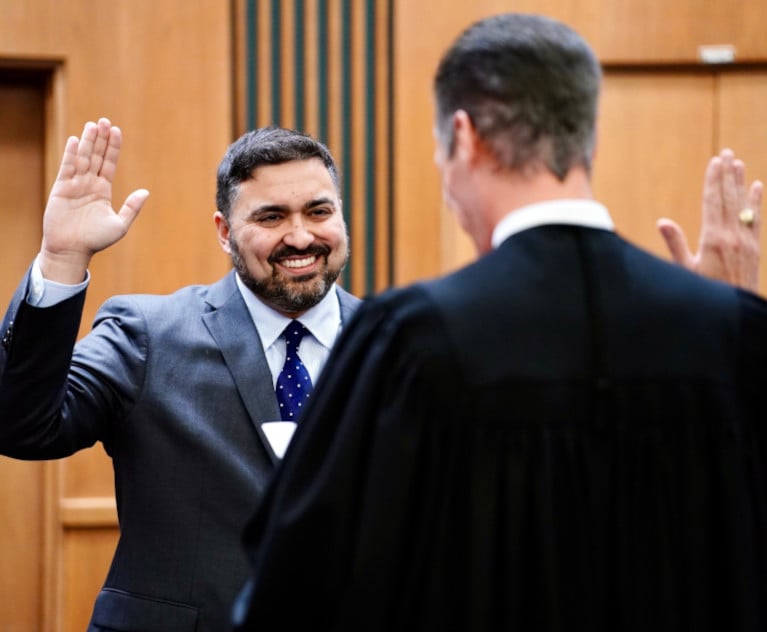Judicial Commission Sanctions 11 Houston District Judges Over Bail Bond Practices
"They've essentially said these judges somehow violated the law. That is wholly, 100% incorrect," said the judges' lawyer, Nicole DeBorde.
August 30, 2019 at 02:16 PM
5 minute read
 (Photo: ANURAK PONGPATIMET/Shutterstock.com)
(Photo: ANURAK PONGPATIMET/Shutterstock.com)
Four current and seven former district judges in Houston plan to appeal sanctions by the Texas Commission on Judicial Conduct that claimed their bail bond practices failed to comply with Texas law and cast public discredit on the judiciary.
Harris County's justice system has been in hot water for years over bail bond practices that lead to lengthy incarcerations of indigent defendants. The county lost a major lawsuit that alleged constitutional violations in its misdemeanor courts and recently entered a settlement to reform its bail bond practices.
Public Admonitions
- 182nd District Judge Jeannine Barr
- 174th District Judge Hazel Jones
- 351st District Judge George Powell
- 337th District Judge Herb Ritchie
- Former 185th District Judge Susan Brown, who now serves as presiding judge of the 11th Administrative Judicial Region
- Former 248th District Judge Katherine Cabaniss
- Former 208th District Judge Denise Collins
- Former 351st District Judge Mark Ellis
- Former 180th District Judge Catherine Evans
- Former 209th District Judge Michael McSpadden
- Former 263rd District Judge Jim Wallace
In contrast, the public admonitions that the commission released on Thursday deal with district judges who solely handle felony offenses.
Nicole DeBorde, who represented the 11 judges before the commission, said that the public admonitions contain misconceptions about what Texas law says about district judges and felony bail bond practices.
"They've essentially said these judges somehow violated the law," DeBorde said. "That is wholly, 100% incorrect. It is not up to them to make those kinds of determinations. The commission is not a body that is designed to answer questions of law. It is not a court. It is supposed to be strictly to address issues of potential judicial misconduct."
The 11 nearly identical public admonitions explained that Texas law created criminal law hearing officers in Harris County who determine probable cause, conduct magistrations, handle warrants and more. The law says the hearing officers must give defendants time to consult with lawyers and must grant bail within 24 hours of arrest, if it's allowed by the law.
The public admonitions noted that Texas law gives magistrates the authority and discretion to release a defendant on personal bond. The court where a case is pending is the only one that's supposed to set the amount of bail and decide if a defendant should get a personal bond. The law requires a judge to make that decision based on a host of factors, such as the nature of an offense, the safety of a victim and the community and the ability of a defendant to pay bail.
However, the sanctioned district judges gave instructions to the criminal law hearing officers to deny all personal recognizance bonds.
Responding to the judicial commission, the judges all said they wanted to determine bond for defendants in their own courts.
In March 2017, Harris County district judges modified their standard bail practices so that personal bonds would follow the law, and low-risk defendants would be favored for personal bonds. Even after the county's bail practices changed, many of the sanctioned judges told hearing officers to keep following a bond schedule, though amounts were often lowered, depending on the circumstances of cases, said the admonitions.
The commission found that the judges failed to comply with the law and maintain competence in the law when they told hearing officers not to issue personal release bonds on the cases in their courts, and when they told the hearing officers to strictly follow a bail schedule that violated the hearing officers' authority under Texas law. The judges' instructions counted as willful and persistent conduct, which wasn't consistent with their duties as judges, and it cast public discredit on the judiciary, the public admonitions said.
"It's certainly being made to look, based on what the commission printed on the website, that the district court judges gave some kind of order to the magistrates. That is not correct," said DeBorde, a partner at Hochglaube & DeBorde in Houston. "What happened is the magistrates actually asked for guidance on how to handle a variety of bonding situations."
She said the county's judicial administrative office and legal department, on behalf of all of the district judges at the time, crafted responses to the magistrate judges' questions. She questioned why these 11 judges were sanctioned and not others.
Since the sanctions came out, the commission has deleted them from its website. DeBorde said they were withdrawn and the matter is concluded.
Read an example of the nearly identical public admonitions:
Related story:
11 Houston Judges Were Sanctioned. What Happened Next is a Mystery
This content has been archived. It is available through our partners, LexisNexis® and Bloomberg Law.
To view this content, please continue to their sites.
Not a Lexis Subscriber?
Subscribe Now
Not a Bloomberg Law Subscriber?
Subscribe Now
NOT FOR REPRINT
© 2025 ALM Global, LLC, All Rights Reserved. Request academic re-use from www.copyright.com. All other uses, submit a request to [email protected]. For more information visit Asset & Logo Licensing.
You Might Like
View All


Trending Stories
- 1Bass Berry & Sims Relocates to Nashville Office Designed to Encourage Collaboration, Inclusion
- 2Legaltech Rundown: McDermott Will & Emery Invests $10 million in The LegalTech Fund, LexisNexis Releases Conversational Search for Nexis+ AI, and More
- 3The TikTokification of the Courtroom
- 4New Jersey’s Arbitration Appeal Deadline—A Call for Clarity
- 5Law Firms Look to Gen Z for AI Skills, as 'Data Becomes the Oil of Legal'
Who Got The Work
J. Brugh Lower of Gibbons has entered an appearance for industrial equipment supplier Devco Corporation in a pending trademark infringement lawsuit. The suit, accusing the defendant of selling knock-off Graco products, was filed Dec. 18 in New Jersey District Court by Rivkin Radler on behalf of Graco Inc. and Graco Minnesota. The case, assigned to U.S. District Judge Zahid N. Quraishi, is 3:24-cv-11294, Graco Inc. et al v. Devco Corporation.
Who Got The Work
Rebecca Maller-Stein and Kent A. Yalowitz of Arnold & Porter Kaye Scholer have entered their appearances for Hanaco Venture Capital and its executives, Lior Prosor and David Frankel, in a pending securities lawsuit. The action, filed on Dec. 24 in New York Southern District Court by Zell, Aron & Co. on behalf of Goldeneye Advisors, accuses the defendants of negligently and fraudulently managing the plaintiff's $1 million investment. The case, assigned to U.S. District Judge Vernon S. Broderick, is 1:24-cv-09918, Goldeneye Advisors, LLC v. Hanaco Venture Capital, Ltd. et al.
Who Got The Work
Attorneys from A&O Shearman has stepped in as defense counsel for Toronto-Dominion Bank and other defendants in a pending securities class action. The suit, filed Dec. 11 in New York Southern District Court by Bleichmar Fonti & Auld, accuses the defendants of concealing the bank's 'pervasive' deficiencies in regards to its compliance with the Bank Secrecy Act and the quality of its anti-money laundering controls. The case, assigned to U.S. District Judge Arun Subramanian, is 1:24-cv-09445, Gonzalez v. The Toronto-Dominion Bank et al.
Who Got The Work
Crown Castle International, a Pennsylvania company providing shared communications infrastructure, has turned to Luke D. Wolf of Gordon Rees Scully Mansukhani to fend off a pending breach-of-contract lawsuit. The court action, filed Nov. 25 in Michigan Eastern District Court by Hooper Hathaway PC on behalf of The Town Residences LLC, accuses Crown Castle of failing to transfer approximately $30,000 in utility payments from T-Mobile in breach of a roof-top lease and assignment agreement. The case, assigned to U.S. District Judge Susan K. Declercq, is 2:24-cv-13131, The Town Residences LLC v. T-Mobile US, Inc. et al.
Who Got The Work
Wilfred P. Coronato and Daniel M. Schwartz of McCarter & English have stepped in as defense counsel to Electrolux Home Products Inc. in a pending product liability lawsuit. The court action, filed Nov. 26 in New York Eastern District Court by Poulos Lopiccolo PC and Nagel Rice LLP on behalf of David Stern, alleges that the defendant's refrigerators’ drawers and shelving repeatedly break and fall apart within months after purchase. The case, assigned to U.S. District Judge Joan M. Azrack, is 2:24-cv-08204, Stern v. Electrolux Home Products, Inc.
Featured Firms
Law Offices of Gary Martin Hays & Associates, P.C.
(470) 294-1674
Law Offices of Mark E. Salomone
(857) 444-6468
Smith & Hassler
(713) 739-1250







